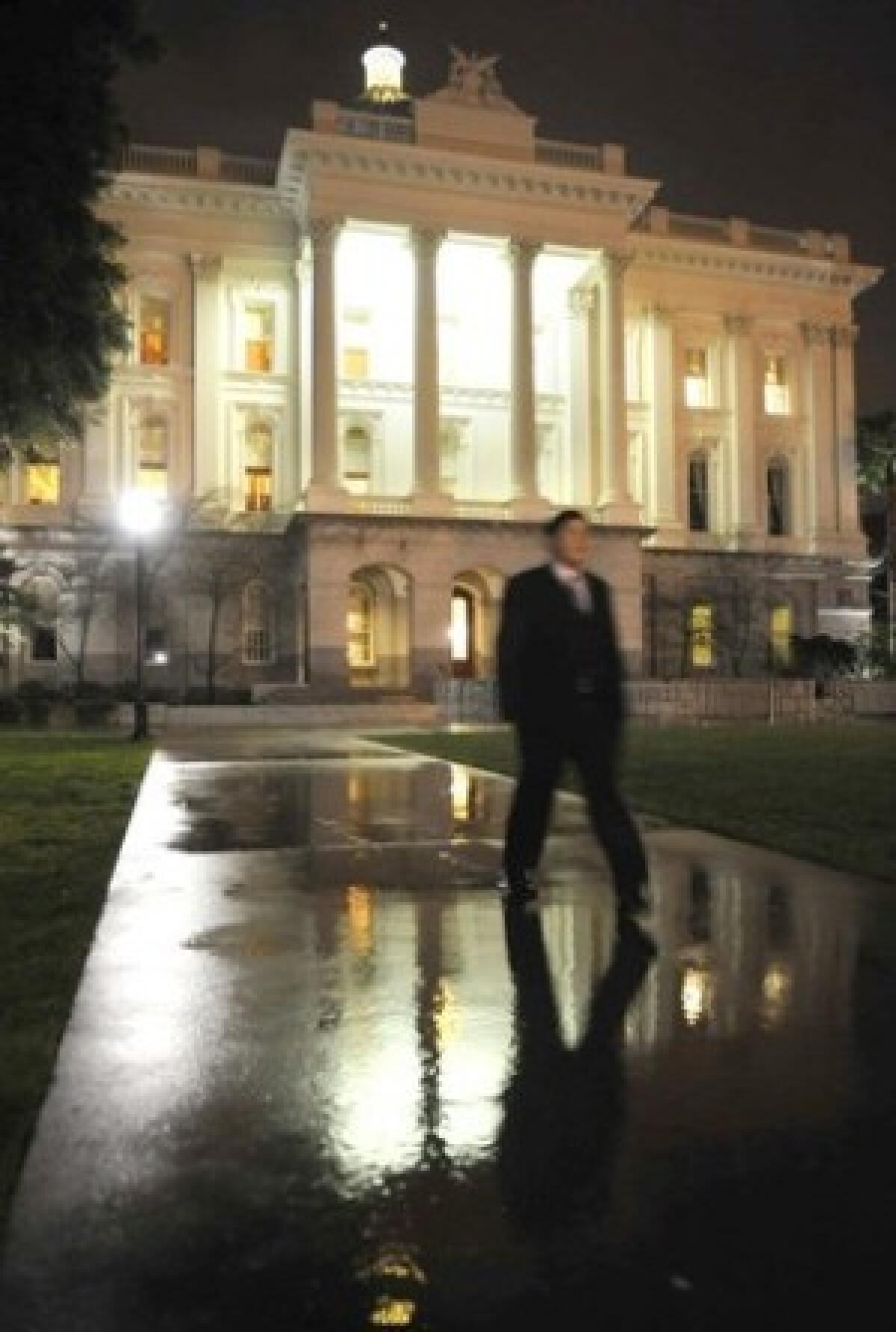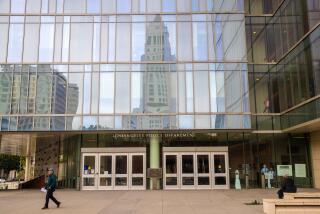Charting a way out of the mess in the Capitol

Here’s a way to start fixing the state Capitol. Maybe also repair some city halls and county courthouses.
The bipartisan reform group California Forward has proposed a modest, reasonable and doable set of significant changes in how state and local governments operate.
The package has something for everyone left and right of center, although it may not satisfy those on the extreme wings.
There’s no denying the problems: gridlock, perpetually late budgets, chronic deficits, IOUs, Sacramento raids on local coffers. . . .
The solutions are a bit more controversial. But these are some steps recommended unanimously by the California Forward’s Leadership Council after 18 months of mulling:
* Lower the Herculean hurdle for legislative passage of a state budget from a two-thirds majority to a simple majority. But retain the two-thirds requirement for tax increases.
Passing an on-time budget would “stop the drumbeat that no one in Sacramento knows what they’re doing,” says the reform group’s co-chairman, Bob Hertzberg, a former Democratic Assembly speaker. The annual summer stalemate over spending is “one of the reasons people hate Sacramento so much.”
Many liberals argue that the majority party -- virtually always the Democrats -- still would be handicapped if it couldn’t raise taxes occasionally to finance the budget. But the counter is that at least Democrats could set the state’s spending priorities, subject to gubernatorial veto.
“Those spending decisions should belong to the majority, as they do in 47 other states,” says Democrat Fred Keeley, the Santa Cruz County treasurer-tax collector, a member of the group’s leadership council and ex-assemblyman. Budgets get deadlocked and distorted, he asserts, while “a minority of a minority hold their breath until they turn purple.”
Anyway, says council member Bruce McPherson, a former GOP legislator and secretary of state: “Let’s face it, the two-thirds process hasn’t worked very well. It’s not an example of how to do good budgeting.”
Do it with a majority vote and let the Democrats be held accountable.
* For fiscal conservatives and anyone with common sense, require that unexpected spikes in tax revenue be spent only for one-time purposes, not to enhance programs in perpetuity.
Require the sponsor of any new spending proposal, whether in the Legislature or at the ballot box, to identify the funding source. No more free-lunch proposals, such as then-actor Arnold Schwarzenegger’s 2002 after-school initiative that became a $550-million annual hit on the bleeding budget.
Budget for two years, rather than one, and regularly monitor the spending plan to watch for red ink.
Set clear goals for each program. If they’re not met, change or chuck the program.
Prohibit the Legislature from raising taxes on a majority vote and calling them “fees.” Democrats tried that last December. The tactic is legally suspect, but worried Republicans insist that it be made unequivocally illegal.
California Forward hopes the required budgeting prudence, along with thwarting the tax-fee shenanigans, will be regarded by both political camps as a fair trade-off for eliminating the two-thirds budget vote.
* Provide local governments with more control over their own fates by barring the state from raiding property taxes and other revenue.
Permit cities, counties and school districts to unite in some common endeavor, such as gang suppression, and pay for it with a tax increase passed by a simple majority of voters. Now it would require a two-thirds vote.
* Relax term limits while reducing the overall time a person could spend in the Legislature. Lawmakers could serve only 12 years, but all of it in one house if they wanted. Now, a legislator is limited to three two-year terms in the Assembly and two four-year stints in the Senate -- a total of 14 years.
If this sounds familiar, it should. A similar proposal was rejected by voters last year. But there’s one very substantial difference in this latest idea: It would affect only future legislators, not the current crop.
The goal again is to allow for growth in leadership, expertise and institutional memory in each house -- and, Hertzberg says, to discourage “people from running for another office every two minutes.”
Legislators would be required to spend part of each year in their district. This is vague and possibly unenforceable. It’s a response to the budding movement to demote the Legislature to part-time status. Petitions currently are circulating to qualify such an initiative for the June 2010 ballot.
The part-time Legislature notion is for another column. But initially, it seems to reflect a Norman Rockwell fantasy, a yearning for a nostalgic era that hasn’t existed in California for at least a half-century. There are many impracticalities for a part-time Legislature in the 21st century.
This state is the most populated in the nation with the eighth-largest economy in the world. It needs a full-time Legislature -- operating under an improved system -- to deal with the state’s increasingly complex problems. Weakening the Legislature merely would shift more power to the governor and the Capitol’s 1,000-plus lobbyists.
There’s also a drive to hold California’s first constitutional convention since 1879 to rewrite the rambling document and submit it to voters. One problem with that is the sponsor, the business-oriented Bay Area Council, intends to select the delegates randomly in some as yet undetermined manner.
Delegates to such a momentous, historic confab should be elected, probably locally, not picked from a phone book.
Anyway, it would take years for a constitutional convention to bear fruit.
California Forward’s package could be adopted by voters next year. The Legislature will consider it in the fall. If it doesn’t place some version on the ballot, the reform group will sponsor an initiative.
“It’s not that we don’t have smart people in Sacramento,” says Co-Chairman Thomas V. McKernan, a Republican activist and chief executive of the Automobile Club of Southern California. “People sometimes are captive of the system they’re in. And unless we change the system, their behavior doesn’t change.”
The quickest, safest route to change is the course mapped out by California Forward.
More to Read
Start your day right
Sign up for Essential California for news, features and recommendations from the L.A. Times and beyond in your inbox six days a week.
You may occasionally receive promotional content from the Los Angeles Times.







